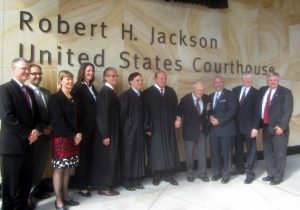Judge John T. Curtin, who died last week in Buffalo, New York, at age 95, was a giant of the Western District of New York bench—he served with great distinction for almost fifty years. Judge Curtin also was a gentleman. I knew him a little bit and had the privilege of learning from him some wonderful, direct memories of western New York people, politics, cases, and law practice in the 1940s and 1950s.
I was pleased to see yesterday’s New York Times obituary for Judge Curtin (click here). It recounts some of the significant cases that he handled, and the wisdom and values he showed as he exercised his judicial power.
The Times obit concludes with this story about a non-incarceration sentence that Judge Curtin imposed in the 1970s on Vietnam War protesters who had burglarized a federal building and destroyed military draft records:
Judge Curtin … presided over a Vietnam War-era case involving five protesters who had broken into Buffalo’s Old Post Office to destroy Selective Service records in 1971. At their trial, they refused to stand when Judge Curtin entered the courtroom, and justified their actions as a legitimate response to the war.
A jury found them guilty of conspiracy to destroy draft records and intent to commit third-degree burglary. But instead of sending them to prison, Judge Curtin gave them suspended one-year sentences and put them on probation.
“Each of you,” he told them, “is free to speak your mind, associate with your friends, attend meetings, travel and continue your efforts in a peaceful manner.”
One of the protesters, Jeremiah Horrigan, called Judge Curtin last year….
Mr. Horrigan, a recently retired newspaper reporter, asked the judge why he had granted him freedom.
“I just followed procedure,” Mr. Horrigan quoted him as saying in a retrospective article he wrote about the case. “I took into account your background, the fact that you had no criminal record, your family situation.”
Mr. Horrigan went on to marry and have two children and four grandchildren. “I tried to tell him how much I owed him [in] the only way I knew how,” he wrote of the judge, “by describing the barest outlines of a life of the luckiest man I know, a life he allowed to happen.”
Coincidentally, on the day following Judge Curtin’s death, Judge Kevin H. Sharp, age 54, resigned from the federal bench in Tennessee. Sharp had been a federal judge for almost six years. His reasons for resigning include his desire to return to private law practice.
Judge Sharp also was motivated to retire, however, by his frustration with federal mandatory minimum prison sentence laws. Enacted mostly in recent decades, these laws require federal judges to impose harsh sentences, sometimes up to life sentences. In Judge Sharp’s personal view, more merciful sentences would have been appropriate and just in some of his cases, but the law did not permit him to exercise such discretion in his sentencing decisions.
In a post-retirement interview (click here), former Judge Sharp put the problem in its human terms:
“The ‘drugs-and-guns cases’ — you say it like that and it sounds like they’re all dangerous [criminals]. Most of them are not. They’re just kids who lack any opportunities and any supervision, [they] lack education and have ended up doing what appears to be at the time the path of least resistance to make a living.”
A wiser, more decent country would have federal laws that permit judges to exercise discretion not to impose harsh prison sentences on individuals who do not deserve them.
Such laws would encourage more people of the humane type that Kevin Sharp appears to be to become federal judges, and to remain on the bench for longer, even lifetime, terms of public service.
Such laws would give the U.S. more judges of the type that Judge Curtin was, in his time, able to be.

